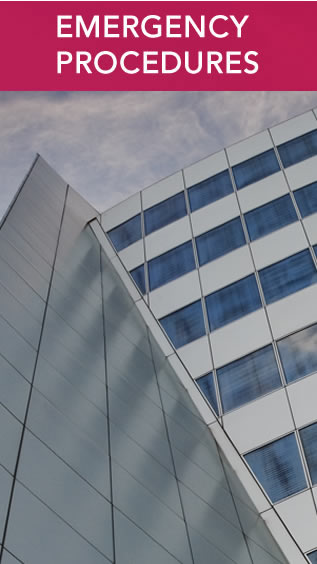Earthquakes are one of the nation’s most frightening natural phenomena. When an earthquake occurs, the ground will shake perceptibly for a relatively short time, perhaps only for a few seconds or for as much as a minute in a great earthquake.
Precautions to take During an Earthquake
- Try to remain calm and to reassure others.
- If you are indoors, move immediately to a safe place. Get under a desk, table, or work bench if possible. Stand in an interior doorway or in the corner of a room. Watch out for falling debris or tall furniture. Stay away from windows and heavy objects (such as refrigerators and machinery) that may topple or slide across the floor.
- Do not dash for exits since stairways may be broken and jammed with people. Power for elevators may fail and stop operating. Seek safety where you are at the time of the incident and then leave calmly if evacuation is necessary.
- Do not be surprised if the electricity goes out, or if elevator, fire, and alarms start ringing, or if sprinkler systems go on. Expect to hear noise from breaking glass, cracks in walls and falling objects.
- If you are outdoors, try to get into an open area away from buildings and power lines.
- Do not be surprised if you feel more than one shock. After the first motion is felt, there may be a temporary decrease in the motion followed by another shock. (This phenomenon is merely the arrival of different seismic waves from the same earthquake). Also, after shocks may occur - these are separate quakes which follow the main shock. Sometimes after shocks will cause damage or collapse of structures that were already weakened by the main earthquake.
Precautions to be taken After the Earthquake
- When the shaking stops, there may be considerable damage and people may be injured. It is especially important that everyone remain calm and begin the task of taking care of one another. The first concern is for those who are hurt, and the next concern is to prevent fires. After that, damage can be assessed and remedial measures begun.
- Remain calm and take time to assess your situation.
- Help anyone who is hurt and administer emergency first aid when necessary. Cover injured persons with blankets to keep them warm. Seek medical help for those who need it.
- Check for fires and fire hazards. Put out fires immediately if you can.
- Check for damage to utilities and appliances. Shut off electricity if there is any chance of damage to wiring.
- Shut off water mains if breakage has occurred. In due time, report utility damage.
- Do not light matches, use any open flames, or turn on electrical switches or appliances until you are certain there are no gas leaks.
- Do not touch power lines, electrical wiring, or objects in contact with them.
- Do not use the telephone except to call for help, to report serious emergencies (medical, fire, or criminal), or to perform some essential service. Jammed telephone lines interfere with emergency services and it is thoughtless to use the phone for personal reasons or to satisfy curiosity. (When the emergency is clearly over, contact relatives and friends so they will know you are safe and where you are).
- Be certain that sewer lines are not broken before resuming regular use of toilets.
- Clean up and warn others of any spilled materials that are dangerous, such as chemicals, gasoline, etc.
- Listen to the radio for information about the earthquake and disaster procedures.
- Be prepared to experience after shocks. They often do additional damage to buildings weakened by the main shock.
- Use great caution when entering or moving about in a damaged building. Collapses can occur without much warning, and there may be dangers from gas leaks, electric wiring, broken glass, etc.
There are no rules which can eliminate all earthquake danger. However, damage and injury can be reduced by following these procedures.


